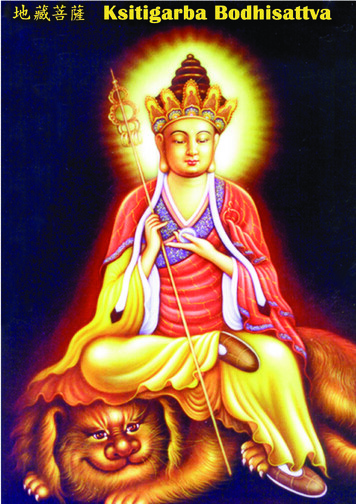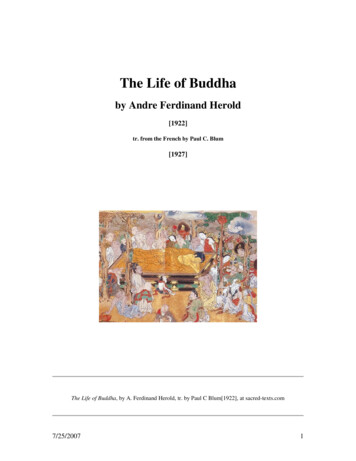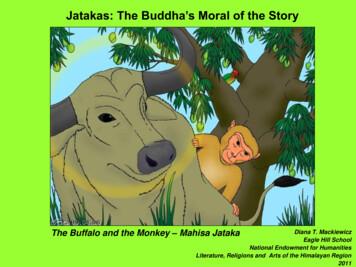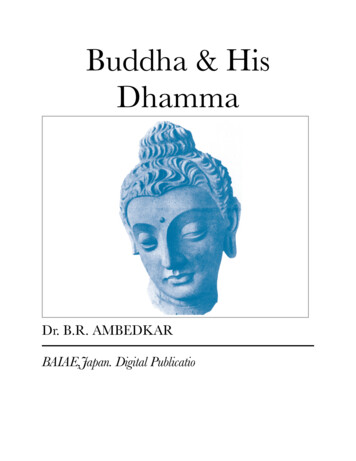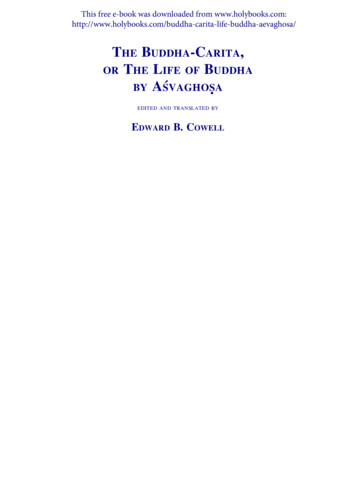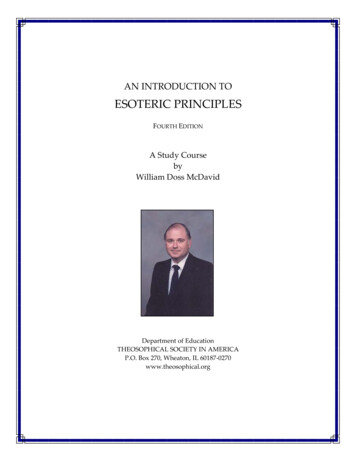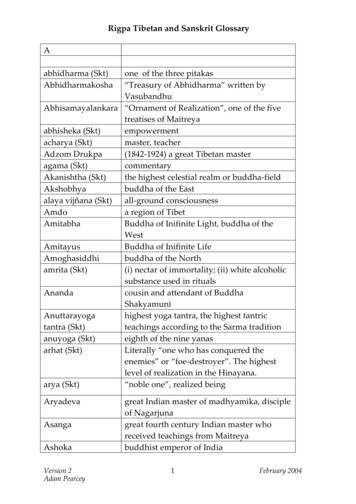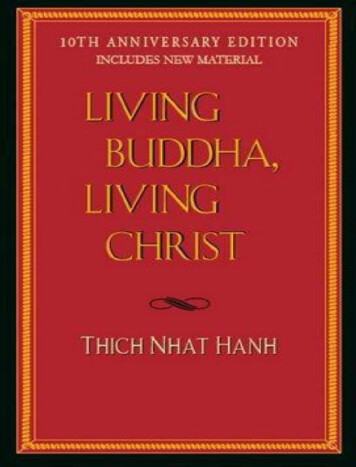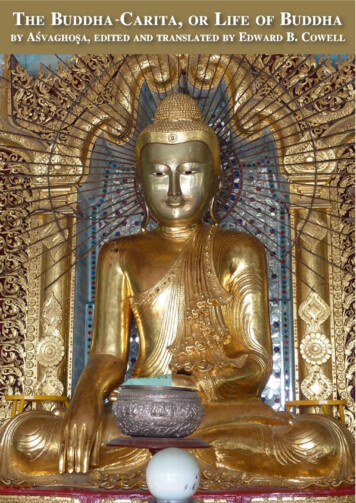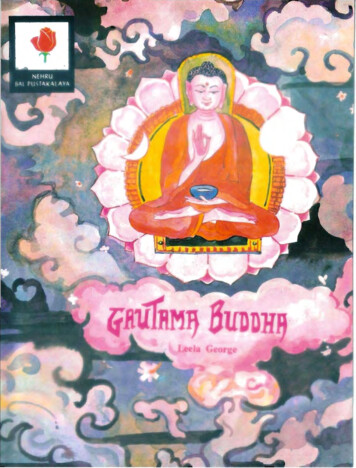
Transcription
ISBN 81-237-1081-XFirst Edition 1982Sixth Reprint 2006 (Saka 1928) 0 Leela George, 1982Published by the Director, National Book Trust, India
, Nehru Ba/ PustakalayaATIO AL BOOK TRU T. I Dl A
-.
Prince SiddharthaMore than two thousand five hundred years ago , therelived in India, in the shadow of the Himalayas, a tribe
/ ,oj( .v,.-'. . called the Sakyas. The chief of the tribe was Raja Shuddhodhana and his queen 's name was Mahamaya. Theircapital was the beautiful city Kapilavastu.One night -Mahamaya had a strange dream. She dreamtt hat four kings carried her up to a lovely lake on a silvermountain, where she was bathed , dressed in fine clothesand bedecked with flowers. Then, they took her to acelestial palace and laid her upon a golden bed. A whiteelephant with a lotus in its trunk approached and afte rgoi ng round her three times struck her side.Learned Brahmins interpreted the dream as a sign thatMahamaya would soon give birth to a great and nobleson . And so it came to pass . When Mahamaya knewthat she was to become a mother, following the custom,she left for her father's house. While she was still on herway, however, a son was born to her in a grove of Salr.J
\' ,jLr/'trees at Lumbini.Mahama ya now turned back and returned to Kapilavastu . King Shuddhodhana received them enthusiasticallyand there was great rejoicing in the kingdom. Short ly afterwards mother and child were visited by thesage Asita. Taking the prince, who was hardly a day old,in his arms he exclaimed with joy, "Indeed he will be aGreat One!" Then tears began to trickle down Asita'scheek.King Shuddhodhana was immediately filled with alarm."What danger is going to befall my son?" he askedanxiously." I am not crying for the child," replied Asita, "but formyself. This child will one day bring deliverance to theworld. I am old and will not live to see that da y. So Icry." Saying this the sage went his way.
8The king and queen rejoiced at hearing Asita's wordsand named their son Siddhartha .Seven days after the bab y' s birth, Mahamaya died .Prajapati, Mahama ya's sister and Shuddhodhana's secondwife, brought him up as her own son.King Shuddhodhana sent for the most learned panditsfrom far and near and of all of them the king asked,"What is the future of my son?"They all agreed with Asita. " He will indeed be a kingof kings . He will be renowned all over the world .""But how?" the Raja wanted to know."He will conquer the world ," said one learned pandit."Only if he stays at home ," added ano ther." He will be a world famous teacher," said the third."Only if he renounces the world to become an ascetic,"added a fourth .Fame as a teacher did not interest Shuddhodhana. Hewanted his only son to follow the Kshatriya tradition andbecome a world conqueror."Keep the prince away from all sorrow and suffering ifyou do not want him to renounce the world ," warned thepandits.So Shuddhodhana decided to try and keep his sonalways happy and only surrounded him with what wasbeautiful. He built three palaces. One was for summer;it was lined with tall trees for shade which caught the coolbreeze. Another was for winter, with open avenues brightwith sunlight and warmth . Yet another was for the rainyseason with spacious halls for indoor games and sports.
All three palaces were surrounded with flower gardens andlotus pools. And the guards were instructed to see thatonly the healthy and you ng would enter the palace s.Here Siddhartha lived in comfort and luxury. He neverwore anything except silk and never went out in the heat,cold or rain. Hundreds of serva nts attended to his everyneed. His playmates were his cousin Devadatta , andKaluda yin, the so n of a mini ster . He was the da rling ofthe Sakyas, the heir of their chief. The people called himGautama, because he belonged to the Gautama clan .One day when he was strolling 10 the palace garaen
Siddhartha saw a flock of wild swans flying overhead. Ju st. then an ar row whizzed through the air and a bird fell,dying.Sidd hartha ran up to it, gently pulled out the arrow,dresse d its wound and tended it. Just then Devadattaarrived and demanded the bird . But Siddhartha refused topart with it.Devadatta complained to Shuddhodhana. " I shot downthe bird," he said, " but Siddhartha refuses to give it tome."When Shuddhodhana questioned his son, Siddhartha
12replied, "I saved the swan's' life, Devadatta tried to destroyit. Shouldn 't a life belong to the one who saves it ratherthan to the one who tries to destroy it?"The force of the argument impressed the king . He letSiddhartha have the bird .As Siddharthagrewup,Shuddhodhanaemployed the mostlearned teachers of the land to instruct him. His son wasclever and intelligent and quickly learned not only to readand write, but also became proficient in the princely artssuch as wrestli ng, fencing and archery.This kind and gentle bo y grew up into a handsome 'youn g man . He was popular, considerate and courteousto everyone. At a family gathering he met hi, COUSln, the.beauti ful Yashodhara and fell in love with h er .Accord ing to the custom of the time Yashodhara'sfather organised an archery contest to select a suitablehusband for his daughter. Siddhartha decided to enter the .contest and win Yashodhara for his own .But Yashodh ara had many suitors. Princes came tromfar and near to win her hand in marriage. They all seemedbig, tough arid strong. Compared to them, Siddhartha notonly appeared somewhat delicate but looked dreamy andthoughtful. Everyone dismissed any chance of his winningthe competition .But they soon had to change their opinion . As the contest progressed Siddhartha proved equal to the others.Bows were brought, the contestants strung them and shotarrows right through the targets. Then aiming high, theyhit distant targets with remarkable accuracy. And so did
13Siddhartha.Finally Siddhartl-a asked for a bigger and stronger bow.A very large bow called Simhahanu'sbow, was kept in atemple . It was so strong that nobody had been able tostring it. A few attendants now ran and brought it him.As the people looked on expectantly, Siddhartha pickedup the bow and strung it with ease. Then he shot an arrowinto the air. The arrow vanished beyond the horizon,making a roaring sound.After this the ot her princes conceded defeat. One by onethey all left and Sidd hartha was declared the winner.Shuddhodhana was very happy. He was now sure that hisson would become a great conqueror and thought thatSiddhartha would never renounce the world or leave awife as beautiful as Yashodhara.J
15However, Siddhartha naturally guessed that there was aworld beyond the palace gates and wondered what it waslike. He would often wander off on his own , find a secluded place and sit for hours, immersed in thought.One day h.e expressed the desire to see for himself theworld outside. When Shudd hodhana heard of this, he didnot object . " Good," said he, " it is time the prince saw h.scountry and the people he will lead one day."Shuddhodhana gave orders that the city should be sweptand cleaned for Siddhartha's visit. Festive arches.were putup to welcome him and hou ses decorated with flowers andflags. Special instructions were issued that the sick a nd theold should keep out of the city. Shuddhodhana took everyprecaution not to expose hi s son to the sight of hum ansuffering of any kind.The chariot was drawn by four gleaming, white horses.Siddhartha to ok his seat and Chann a, the charioteer,drove him slowly through the city. The people lined up onboth sides and cheered their prince.Siddhartha received their greetings with folded hands." The people are happy," he thought. " The world is indeeda happy place."But he wanted to see more . "Let us go that way," hetold Channa. So Channa turned the chariot into a bylane.There the people were not expecting Siddhartha . 1 herewere no welcoming banners and the streets were dustyand crowded . An old man, with bent back came hobblingalong, supported by a stick."Who is that?" exclaimed Siddhartha in surprise.
16"An old man," replied Channa.Back in the palace, Siddhartha became thoughtful andsad.
17" Would his beautiful Yashodh a ra grow old and looklike that? Would he too grow old?"When Shuddhodhana heard abo ut it he sent dancersand musician s to divert his son. And for a time theysucceeded . But the world outside still worried Siddhar tha.He wanted to see more of it . So a nother visit to the citywas arran ged.As before , the people received Siddhartha with greatenthusiasm. " Surely the y are happy," thought the prince.But when he was returning to the palace he saw a sickman who was hardly abl e to walk. His body was coveredwith sores and he was groaning with pain. . " Why is that man cry ing?" asked th e prince."He is sick," answered Channa .And Channa explained that everybod y got sick, andsuffered pain. Slowly th e world of sorrow and sufferingwas being unve iled to the prince' s gaze.And on yet another day when he went to the city in hisroyal chariot, he saw a corpse being carried to the burningghat." Where are they taking that man?" Siddhart ha asked."That man is-dead,' said Channa. " They are taking himto be cremated." And he added, " A ll who are born mustone da y d ie.""Old age, sickness, death? The world is indeed a sadplace, " thought the compassionate prince. He was greatlytroubled and wanted to know why there was so muchsorrow and suffering.The next time while driving along in his chariot he came
across an ascetic in yellow robes. The man looked calmand peaceful."Who is that man?" he asked eagerly."A sadhu," replied Chan na. "He has renounced theworld , and is indifferent to sorrow and suffering. He is atpeace with the world, qui etly searching for the eternaltruth." This gave Siddhartha some hope. Siddharthawanted to be like him . He too decided to renounce theworld and become an ascetic.While he was still thinking deeply about these matters, ason was born to him. The baby was named Rahula. Whilerejoicing at the birth of his son, the restless prince decidednot to be diverted from his purpose. He was determinedthat he should ren ounce the world without further delay.Siddhartha was th en twenty-nine year s old. He woke upin the dead of night while hi s wife Yashodhara was fastasleep, with one hand lying on Rahula. Siddhartha wanted.: ---.:;-
to take the child into his arms for the . last time but wasafraid that his wife might wake up . ot even daring tolook a second time , he hurried o ut of the palace.Accompanied by his faithful charioteer, Channa, hewent into the forest. He cut off his hair and sent it back
21to the palace through Channa as a sign of his havingbecome a sadhu and exchanged his princely robes for anascetic' s gown. Then he set forth in search of tr uth.Siddha rtha became a Sak yamun i, a sage among theSakyas. In his wanderings he reached the .famous city ofVaisali where he stayed for some time in the hermitageof the seer Alara Kala ma trying to find the truth aboutlife. He studied different systems of philo sophy, but noneof, them gave him the answers he was seeking.'He then came to Rajagriha, the capita l of Magadha,the most powerful kin gdom of th e time. There he joined 'a famou s school run by a great scholar Udraka. Gautamawas impressed by Udraka's vast learn ing but soon feltthat mere learning could not lead one to truth. He left theschool to continue his search.Would a life of severe penance lead one to truth '1Gautama thought he should try this ancient method of thesages, He was joined by five ascetics who asked to becomehis d isciples, W ith these five disciples he retired into theforest and began a perio d of pena nce. He put his body tohardships of many kinds and almost died from fasting,but still found that he was no nearer to the truth. He concluded that severe penance was useless and gave it up. Hisfive disciples took this as a sign of his having gone backto the worldly life and left him.Siddhartha went to a nearby river , iranjana, and bathed. He was so weak, however, that he was almost carriedaway by the current. With great difficulty he came ashore.Sujata, a young woman who lived in the neighbourhood
-Ibrought him a bowl of rice boiled in milk . After eating ithe felt stronger.Finally, Siddhartha decided that the way to truth lay indeep medit ati on . He chose acharming spot on the outski rtsof Gaya and sat down cross-legged under a peepul tree." I will not rise from thi s seat till I understand the truth,"he vowed .While thus immersed in meditation it is said that Siddh-
23toart ha hadface many temptations. The evil spirit. Mara,was afraid that if Siddhar tha came to know the truth, hewould teach it to the world . Mara would then no longerhave any standing.So he first tempted Siddhartha with a vision of hispalace, his beautiful wife Yashodhara and little son RahuJa.But Siddhartha did not allow himself to be tempted andcontinued hi s meditation . Then Mara sent violent stormsand whirlwinds to distract him, but the determined sagewas not dist racted. As a last resort Mara sent his threedaughters-e-Desire. . Pleas ure, and Passion-to d ancebefore Siddhartha and tempt him. But t hey too had noeffect on him. He cont inued to be lost in dee p meditation .On the forty-nint h day he realised the truth . He becameth e Budd ha-the Enlightened Cine. Th e tree under whichSiddhartha attained enlightenment was thereafter calledthe Bodhi tree.
26tha t he did not hesitate . To spread his id eas among thepeople, however, ne needed a band of loyal followers .His first thought was of the five disciples who had lefthim and were continuing their penance in Sarnath, nearVaranasi. So to Samath the compassionate Buddha turnedhis steps.His former disciples saw him 'app roach fro m a dista nce." Here comes Gau tama our old teacher," observed one ofthem." He who left us for the worldly life," scoffed another." But he still seems to be an ascetic!" exclaimed a third." But he shall receive no greeting from us," they all said.But when the Buddh a came near the y saw that the re wasa certain radiance about him. They realised they were inthe presence of a great being and sat down to listen to hiswords. To th ese five disciples the 'Buddha gave his firstsermon.The sermon began with the Buddha advi sing his di sciples to avoid extremes. He said a life of severe penan ce andmortification was as bad as a life of play and pleasure .People should keep to the middle path, the golden mean .Only then could orie have a correct view of life and realisethe truth.The truth that the Buddha preached was firstly that theworld is full of sorrow and suffering. Secondly this sorrowhad a cause. Thirdly to master suffering the cau e of it mustbe removed . Fourthly this can be done by following thenoble Eightfold Path. These are what are known as theFour Noble Truths of Buddhism, which were explaine d by
27the Buddha in his first sermon at Sarnath .Th e eightfold path that the Buddha preached enjoins:right views, right aspiration s, right speech, right behaviour,right living, right effort, right tho ughts and right contemplation. This is, the Dhamma, the law of righteousness. TheBuddha urged aU men to foUow this law and be saved frommiser y.Th e sermo n at Sarnath was only the beginning. For therest of hi s life the Buddha trav elled the country tak ing hismessage of righteousness to the people. Sanskrit was atthe time the language of schola rs and the nobility. TheBuddha preached in Pali, the language of the commonpeople so that everybody would understand him .
28The Buddha' s teachin gs were very simple and coul d beeasily understood . The Buddha believed in the doctrine ofkarma according to which he pointed out that man's soulwas imperishable and after death would be reborn andcome back to life. In each birth man inherits the results ofthe actions of his previous life.The ultim ate goal of life is Nirvana, the escape fromthe cycle of births and rebir ths. Th is can be attained by alife of virtue an d goodne ss, followin g the knowledge andMidd le Path taught by th e Buddha.The Buddha was a great prophet of ahimsa, non-violence.To him life was sacred and his followers were enjoined notto kill. Th is was not to be taken in the narrow literal sensebut included any type of violence inflicted by word or deed.The first step was for man to discipline him self. Withoutproper self-discipline it was imp ossible to lead a virt uouslife. The Buddha says, " He who does not rouse himselfwhen it is time to rise, who tho ugh young and strong,is full of sloth, whose will and th ought are weak , that lazyand idle ma n never fi nds the way to knowled ge."The Buddha considered compassion as the hi ghest virtue.Even as a boy his compassion was aroused at the sight ofan injured bird. He said, " Just as a mother car es for heronly child, so should man feel an all-embracing love for allliving beings."Love conquers all, violence.is to be met by non-violence,as also hatred is to be met by love: "Never in this worlddoes hatred cease with hatred, hatred ceases through love."
30At that time there lived in Varanasi awealthy youngman named Vasa. Vasa was dissatisfied with life and oneday he left home with no particular aim or destination inmind. Fortunately he met the Buddha and was attracted byhis divine personality. The Buddha advised him to followthe Noble Path and Vasa was converted. He became amonk , and joined the Sangha.Vasa's father came in search of his son. He too met theBuddha and became hi s follower. But he did not leave hishome and family. He remained a lay disciple. Later theBuddha visited Vasa's house and taught the Noble Path toVasa' s mother and his wife. They became his women laydi sciples.The Buddha did not insi st on all his followers becomingmonks and nuns. H e believed th at onl y a few had the temperament and inclination to renounce the world . Mostpeople he expected to live ordina ry lives according to themoral code he had taught. They were his lay disciples. TheSangha, the Buddha and his teachings or the Dhammawere to be the ir guides.The Buddha took reat interest in the development ofthe Sangha. He organised it into a disciplined band of men,trained to explain and spread his teachings to all mankind.The Buddha met many ascetics and won them over tothe Middle Path . One of the early converts was the fireworshipping Brahmin priest Kashyapa, afterwards knownas Mahakashyapa, who succeeded the Buddha to the headship of the Sangha.With Kashyapa five hundred of his disciples joined the
31Sangha . Later Kashyapa's two brothers with followin gs ofthree hundred and two hundred disciples also joined. TheSangha grew and the fame of the Buddha as a teacherspread all over the counrrv.Soon arterwards, the Buddha visited Rajagriha, theMagadhan capital, accompanied by the monks who werehis followers. Bimbisara was then the ruler of Magadh aand when he hea rd of the Buddh a' s visit he came with hisnoble s to pay his respects to the holy man . .The Buddh a received them kindly and preached the lawof righteousness to th em. The king and hi s nobles becamehi s followers. So pleased was the king with the teachingsof the Master that he exclaimed , " I have now been blessedwith everything. Even more than my kingdom I value theseteachings." And he reques ted the teacher, "Great sage; Ishall consider it an honour if you and the reverend monkswould come and have a meal at my palace ." The Buddhaaccepted.Kin g Bimbisara made elabo rate preparations for the m.He put welcome arc hes along the route the Buddha andhis di sciples were to take and himself came down to thepalace-gate to receive the honoured guests and led themto a decorated hall. The Buddha was seated on an elevatedplatform . The king served him with his o wn hands.After the meal, the king said, " As a sign of my devotionI wish to make a gift of the Veluvana Park to the sagereque st that thi s humble gift be accepted ."The Buddha accepted the gift . At Veluvana Park, juston the out skirt s of the cit y, he founded the first Vihara or
32mona stery. The Viharas were to serve him and his monksas places of contemplation and learning.In those days it was the custom for ascetics, whatevertheir sect, not to wander about during the rainy season .These three months they spent in some hermitage ortemple . This practice was known as going into retreat.Buddhist monks spent their retreats in the Viharas.It was during thi s visit to Rajag riha that the Buddha con-,.,r,{:.; . . .0I- . V', ,Ai,.fiI."-. , . IIverted Sariputra and Moggallana, two of the most famou smonks of the Sangha . Before they became follower s of theBuddha , Sariputra and Moggallana were wanderingascetics . They had been friends from childhood and had
33renounced the world in search of the truth. They haddecided that the one who first came to know the truthwould tell it to the other.One day, Sariputra in his wanderings came across Assaji, one of the first five disciples of the Master. Sariputrawas impressed by Assaji's noble bearing. He asked, "Whois your teacher , brother? Whose Dhamma do you follow?"" I follow the sage of the Sakyas ," answered Assaji.(/." w hat does he teach?"Assaji thereupon explained to him the Dhamma thatthe Buddha preached."This is the truth that 1 have been searching for,"
34exclaimed Sariputra.He hurried to tell his friend Moggallana. Together theywent to the Buddha and were received into the Sangha.
36his rightful place as leader of the Sakya people.So when Shuddhodhana heard that the Buddha waspreaching at Rajagriha he sent one of his trusted ministers with a thousand men to invite him to Kapilavastu.The minister and his men arrived when the Buddha waspreaching to a large gathering of people. They joined thecrowd to hear the Master. They were so carried awaywith the sermon th at they were con verted at once. Theyrenoun ced the world and became monk s. Becoming totallydetached from the worl d, they forgot the purpose of theirvisit. The invitation was not conveyed to th e sage.Then Shuddho dhana sent Kaludayin, the childhoodfriend and playmate of Siddhartha . After heari ng theMaster preach Kaludayin also became a monk but he didnot forget hi s pro mise to the king . One day while the 'Buddha was resti ng in a park, Kaluda yin said quietly," Lord your father, aunt Prajapati , and 'wife Yashodharaare an xious to see you. The king has sent me here specia llyto request you to come."The BUddha remembered the relatio ns he had left a ndwished to see them, if only to show them the path ofrighteousness he had discovered. He started off forKapilavastu. Kaludayin went aheadto informShuddhodhana nbout the visit.Shuddhodhana came out of his palace with his ministersand nobles to welcome his son . When the king sawthe Buddha, he was struck by his radiance and dignity.Embracing his son he said. "I grieve no more. You havefound the path to save all mankind ."
37Having chosen to become homeless monks, the Buddhaand his disciples would not stay in the palace. KingShuddhodhana arra nged for them to live in Nigrodha Park,not far from the city.Many people came to Nigrodha Park to pay theirrespects to th e Buddh a. At first the Sakya nobles refusedto come; they said the Buddha had disgraced his peopleby becoming a wandering hermit. But when ultimatelythey did come and listened to him , the y were so moved byhis words that many of them renounced the world andfollowed the Buddha.The next morning the Buddha, as customary amongmonks, to ok his bowl and set out t o beg. The news reached Shuddhodhana. "What! My son would beg in thestreets of Kapilavastu? " he mou rned .Shuddhodhana rushed o ut to his son. "Why do youdisgrace me thus?" he asked . "I can easily give you andyour monk s food . Do not go begging."" This is the custom among my people ," replied theBuddha ." How can that be, my son?" asked Shuddhodhana."You are descen ded from kings!""No," the Buddha said, "I am a monk . Monks have noworldly descent."Without another word the king conducted the Buddhaand his monks to the palace . The royal family came out togreet him. Among them was his aunt, Prajapati, and otherladies of the palace . But Yashodhara was not there. Sherefused to come saying, "If I am deserving of any regard
38he will come to see me."Shuddhodhana told the Buddha, " The seven years youwere away , Yashodhara led a life of renunciation . She cutoff her hair and dressed in yellow robes. Indeed , she ha slived like an ascetic."The Buddha at once went to Yashodhara's room.Yashodhara fell at his feet and wept. The Buddha prai sedher devoti on and gave her his blessings,The Buddha's son Rahula was then seven years did . Theboy had no knowledge of his father and had been underthe impression that he had no father othe r than Sh uddhodhana. On the seventh day after the Buddha' s arri val inKapilavastu, Ya shodhara dress ed Rahul a as a prince andsent him to his father to ask for his inheritance. Whenthe boy approached asking for his inheritance the Buddhaturned to his disciple Sariputra and said, " Admit him int othe Sangha ."
I
41The re is the storyo f Prasenajit, the powerful ruler ofKo sala. Once, Prasenajit was making preparations for agrand animal sacrifice . The Budd ha went to the hall ofsacrifice and pleaded for the animals. King Prasenajitlistened to him and was converted to the path of ahimsashown by the Master.Anot her famous convert was Angulimala, a notoriousoutlaw who wore a necklace of human fingers taken fromth e hands of his victi ms! To this viol ent dacoit went thecompassionate Buddha, unarmed and unattended. Thedacoit was im pressed by the coura ge of this man of ahimsaand was con vert ed . He became a prominent member ofthe Sangha .Vishakha was a famous woman convert. She was thedaughter of Dhananjava, a ric h banke r of Shravasti , th ecapi tal city of Ko sala . As a girl she had becom e at ollowerof the Buddh a alo ng with her fat her and hi s entire household. When she grew up, Vishakha was married toP urn avarth ana, the son of another ric h banker, Migara,also of Shravasti.Migara was not a follo wer of the Buddha. He was, infact, a Jain an d was not even sympathetic to the Buddhaand his teachings. When the Bud dh a came to ShravastiVishakha wanted to invite him to the house.'But Migara would not agree. "Don't you know that hehas made many young men renounce the world andbecome mon ks. Indeed he has bro ken many homes andnow you want him to come to our ho me."" T hat is a ru mour his enemies have spread," Visha kha
42pleaded. "I know that he will bring only. peace andhappiness to the household.""Father, what harm is there if he comes here?" herhusband interrupted in support of his wife. "We will onlybe showing him the ordinary courtesy due to a holyman!"Finally Migara agreed. Vishak ha invited the Buddha tothe house. Vishakha was convinced that once her fatherin-law heard the Buddh a speak, he would be conve rted . Soshe arranged things in such a way that Migara heard theBuddha when he spok e to the members of the family.As expected, Migara was so moved by the words of thecompassionate Buddha that he was converted.Vishakha never missed a sermon given by the Master inShravasti. Once, on entering the hall where the Buddhawas preaching, she removed her jewelled headpiece andkept it aside . She forg ot about the jewel and went' homeafter the sermon witho ut it.The venerable monk Ananda, a disciple of the Buddhafound the headpiece after everybody had left. He guessedthat it belonged to Vishakha an d sent it to her through aservant .But Vishakha would not take it back . She donated it 'tothe Sangha.The ornament was so expensive that there was nobodyin Shravasti rich enough to buy it. So Vishakha came forward to buy it herself. With the money she built a Viharafor the Buddha and his disciples and called it the EasternPark. It became the favourite abode of the Buddha
43whenever he came to Shravasti.Ananthapindika was a rich merchant of Shravasti. Hisreal name was Sudatta but because of his many deeds ofcharity he had been given the title Ananthapindika, meaning the giver of alms to the unprotected.Once, on a visit to Rajagriha on business, he stayedwith his sister. He saw that elaborate prepa rations werebeing made to welcome somebody. Ananthapindikathought that it must be the Magadha king Bimbisacahimself that his brother-in-law was expecting.But his brother-in-law said, " Lo rd Buddha is comingwith his monks.""Where is he?" enquired Ananthapindika eagerly."Just now he is in Sitavana," said his brother-in-law,ind icati ng a park not far from the city.Anan thapind ika wanted to go at once and . meet theBuddha. But his brother-in-law stopped him. "It is toolate. You can go early in the morn ing."Ananthapindika hardly slept that nigh t. He got upthrice thinki ng it was already morning and before sunrisehe fi nally rose and set off for the park. He reached Sitavana even before the Buddha had woken .The Buddha received him kindly and advised him tofollow the Dhamma. Ananthapindika was greatlyimpressed by the Buddha and was ready to leave hisresponsibilities as a householder and become a monk . "Iwant to renounce all my riches and become a monk in theSangha," he said."There is nothing wrong in being rich," said the Buddha.
-1-
/
46"What is wrong is undue attachment to riches. Moreover,one must be willing to use one's wealth for the commongood."" Many depend on me for their living," said Ananthapindika."Then how can you renounce the world and let them. go hungry?" asked the Buddha . "It is not essential for oneto give up the world to follow the path of righteou sness.The life you are leading is a good one . Why renounce it?"Ananthapindika rejoiced at the words of the sage. Heoffered to build a monastery at Shravasti for the monks'retreat during the rainy season. The Buddha accepted.Ananthapindika took Sariputra, a prominent di
ISBN81-237-1081-X First Edition 1982 Sixth Reprint 2006 (Saka 1928) 0 Leela George,

